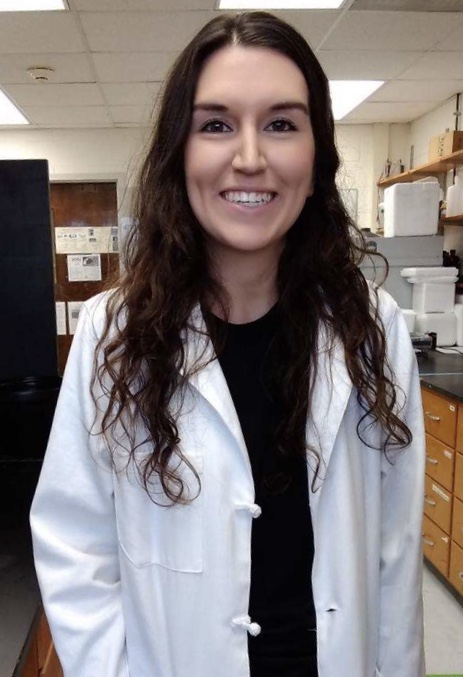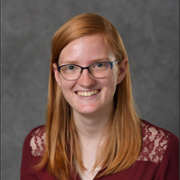Two Michigan State University graduate students recently won the inaugural awards from the NEOGEN Land Grant Prize in a competitive selection process. Each student was awarded $30,000 to advance their research projects: one focusing on drug discovery and the other on the economics of climate change.
This award — administered through MSU’s Office of Research and Innovation —is funded by a gift from former Provost and Vice President for Research and Graduate Studies, Dr. John E. Cantlon, and his wife, Irene Cantlon. The endowed award program seeks to advance the work of MSU graduate students whose research has potential to contribute to economic and scientific improvements in society, with a promise of practical applications that benefit U.S. economic interests. With this gift, the Cantlons sought to highlight NEOGEN and MSU’s mutual goals of scientific research excellence.
As part of the award application process, both students shared foundational work already accomplished related to their research as well as presented evidence that validates its potential economic impact.

Graduate student Allison Vanecek’s work focuses on the exploration of a novel therapeutic strategy for Lou Gehrig’s disease (ALS)
Exploring treatment options for nervous system disease
MSU graduate student Allison Vanecek’s work focuses on the exploration of a novel therapeutic strategy for Lou Gehrig’s disease, also called Amyotrophic Lateral Sclerosis or ALS. There is no cure for ALS, nor effective treatments to slow or halt the progression of the disease. Vanecek’s research and proposal exposes a new treatment that could help those affected by ALS.
Vanecek’s team is hoping to design and synthesize novel “20S proteasome activators” to better understand implications of the progression of ALS. 20S proteasome activation works through a completely unique mechanism over any other current drugs on the market, offering a novel approach for treating disease.
“I am so grateful to be awarded the NEOGEN Land Grant Prize. This award will have a huge impact on my research and will provide the opportunity to explore many more possibilities to further investigate this new therapeutic strategy,” Vanecek said. “Ultimately, my greatest hope is that it will also have an even larger impact on society, leading to the development of a new treatment to help those affected by ALS.”
Jetze J. Tepe, a professor of chemistry in MSU’s Department of Chemistry, Pharmacology & Toxicology and Vanecek’s mentor, said the award is a well-deserved recognition of Vanecek’s accomplishments and discoveries, allowing her to further explore her new compounds as a possible treatment for ALS.
“Allison’s work investigates a completely new treatment strategy that may one day provide the basis for a therapeutic treatment for ALS,” Tepe added. “Her discoveries have been patented by MSU and are currently being explored by a biotech company for their clinical potential.”

Graduate student Sarah Manski’s project assesses the risk climate change may have on farmers in the U.S.
Investigating the economic impact of climate change
MSU graduate student Sarah Manski’s project assesses the risk climate change may have on farmers in the U.S. With the ever-changing climate and increasing temperatures, overall farm health and income are at risk.
Manski’s proposal focuses on building a predictive model to quantify the risk value of soil health practices, such as conservation tillage, diverse crop rotations, and cover cropping, and the savings that would be accrued by adopting these regenerative practices.
Throughout this project, Manski has worked with a team convened by Land Core, a nonprofit organization focused on increasing adoption of soil health practices. The team includes faculty and researchers from MSU, UC Berkeley and Stanford. The team is also in close contact with colleagues from Regrow (formerly Dagan, Inc.), CiBO Technologies, Open Rivers Consulting Associates and Colorado State University.
The team partnered with the farm credit cooperative Compeer Financial to apply the risk model directly to the financial infrastructure of agriculture. The agriculture business provides the U.S. nearly 5.2% of GDP and supplies 22.2 million jobs to U.S. workers. Manski’s risk model has the means to create economic rationale for financial institutions like Compeer to develop incentives for soil health practices that move towards a regenerative, resilient agriculture.
Funds provided through the NEOGEN Land Grant Prize will help Manski and her team expand and verify their data, improving the quality and scope of the model. The funds will also support the risk model expansion across three to five additional states, including Michigan, and eventually the entire Midwest.
Land Core intends to use the model’s outputs to help develop policy and generate a 2023 farm bill that would support a resilient food system. In addition, the team eventually plans to work with the MSU Innovation Center to help with the commercialization of the risk model.
“I am honored to have received the NEOGEN Land Grant Prize for continuation and expansion of my research,” Manski said. “This grant will go a long way to expanding the impact of our project throughout the Midwest, especially to my home state of Michigan. Our work has the potential to facilitate widespread adoption of regenerative agriculture and, in the spirit of land grant institutions like MSU and the Neogen Land Grant Prize, make American agriculture more sustainable, climate-resilient and climate-friendly.”
Frederi Viens, Manski’s mentor and a professor in MSU’s Department of Statistics and Probability, said he was not surprised that Manski was awarded the NEOGEN Land Grant Prize.
“She is a highly competent statistical and mathematical scientist, an excellent science writer, and is fully committed to the cause of regenerative and sustainable agriculture,” Viens said. “It's an honor to work with her on this project as her supervisor.”
Manski understands how important it is for our country's public and private agriculture policies to benefit farmers, Viens explained.
“She and the whole team have as a primary objective to keep farmers' interests at the top of every decision,” he said. “As a Michigan farmer myself, this means a lot. By working with a major farm lender, we are going straight to the source of how we can make a difference in farmers’ pocketbooks, and now with Ms. Manski's plans under the NEOGEN Land Grant Prize, our project's potential will extend to Michigan farmers.”
-Story by Tracy Henion, MSU Innovation Center
